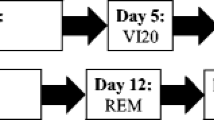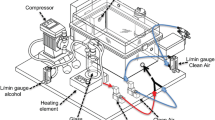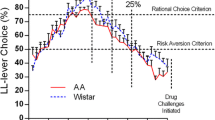Abstract.
Rationale: There at least two ways in which tolerance development to alcohol's behavioral effects could interact with its subsequent intake: 1) tolerance to alcohol's reward or reinforcing effects per se could lead to increased consumption, and 2) tolerance to alcohol's aversive effects could unmask alcohol's rewarding effects. These two mechanisms may differentially interact with preexisting genetic traits underlying alcoholism. Objectives: Alcohol's subjective attributes were assessed in selectively bred AA and ANA rats after the development of tolerance to alcohol's behaviorally disruptive effects on lever-press performance. Methods: Rats were trained to press a lever under an FR30 schedule of food presentations. Group-dependent differential access to intoxicated practice, using a typical pre-post drug administration design, was utilized to promote the development of alcohol tolerance in only the group receiving intoxicated practice sessions. Subsequently, rats were trained to associate alcohol with unique place and taste stimuli in order to assess the relative changes in the approach towards, or avoidance of alcohol-related cues in each group. Results: Groups of AA and ANA rats given access to intoxicated practice demonstrated tolerance development. These groups subsequently conditioned place preferences and failed to develop conditioned taste aversions to alcohol. Passive alcohol exposure in the ANA rats set the occasion for the development of a place preference and delayed taste conditioning. AA rats exposed to passive alcohol exposure failed to condition place preferences and developed rapid taste aversions. Saline control rats failed to develop tolerance or place preferences but did condition a robust alcohol-induced taste aversion. Conclusions: AA and ANA rats differ in their behavioral and pharmacokinetic response to chronic alcohol exposure. Compensatory responses interacting with approach-avoidance behaviors appear to be learned during intoxicated practice in the AA rats and during both intoxicated practice and passive exposure in the ANA rat line.
Similar content being viewed by others
Author information
Authors and Affiliations
Additional information
Electronic Publication
Rights and permissions
About this article
Cite this article
Gauvin, D., Baird, T. & Briscoe, R. Differential development of behavioral tolerance and the subsequent hedonic effects of alcohol in AA and ANA rats. Psychopharmacology 151, 335–343 (2000). https://doi.org/10.1007/s002130000477
Received:
Accepted:
Issue Date:
DOI: https://doi.org/10.1007/s002130000477




